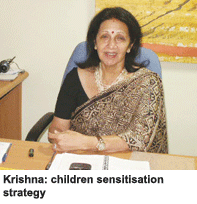The first Indian president of the World Crafts Council (WCC), elected for a four-year term in 2008, Usha Krishna has committed her time and influence to the cause of crafts and craftspersons, thus ensuring that governments and policy makers around the world give them due recognition and rewards. WCC is a non-government organisation established in 1964 in New York with the objective of empowering native craftsmen in Asia, Asia Pacific, Europe, Latin America and North America. For several decades, Krishna has been devising multi-level strategies to upgrade the image and rewards of craftspersons worldwide.
 An important component of her overall strategy is to introduce craft education to school children. “It’s important to expose children to India’s rich but endangered craft traditions and sensitise them to our cultural heritage and value systems. We have been conducting craft workshops in schools for over a year, with skilled crafts-persons as teachers. This raises the craftsperson’s self-esteem while enabling children to learn from hands-on experts. Children have shown great enthusiasm in learning shell craft, fresh flower weaving, mat weaving, tie and dye techniques and palm leaf knitting. They learn to work with their hands and appreciate the value of hand-made crafts which are threatened with extinction by mass manufactured factory-made goods,” says Krishna, an alumna of Mysore and Madras univer-sities with a diploma from IIM-Ahmedabad.
An important component of her overall strategy is to introduce craft education to school children. “It’s important to expose children to India’s rich but endangered craft traditions and sensitise them to our cultural heritage and value systems. We have been conducting craft workshops in schools for over a year, with skilled crafts-persons as teachers. This raises the craftsperson’s self-esteem while enabling children to learn from hands-on experts. Children have shown great enthusiasm in learning shell craft, fresh flower weaving, mat weaving, tie and dye techniques and palm leaf knitting. They learn to work with their hands and appreciate the value of hand-made crafts which are threatened with extinction by mass manufactured factory-made goods,” says Krishna, an alumna of Mysore and Madras univer-sities with a diploma from IIM-Ahmedabad.
A member of the prominent Chennai-based T.V. Sundaram Iyengar and Sons (TVS) family, Usha Krishna ventured into business late in life when she promoted Upasana Engineering Ltd (a subsidiary of the TVS group, the largest manufacturer of auto components in India) in 1984. But her engagement with the handicrafts sector precedes her entry into industry. She has been a member of the Crafts Council of India for over three decades and served as its vice president for 15 years.
To assist her in executing other WCC activities, Krishna has organised a “dream team” of volunteers. Together they plan to increase the membership of WCC which currently has 90 member countries; partner with media for awareness campaigns; create marketing opportunities for craftspersons through exhibitions; espouse the cause of craftsmen with the Central and state governments and raise funds. Krishna’s plans to collaborate with other coun-tries and capture new markets will find expression in an international conv-ention titled ‘Abhushan: Design Dialogues in Jewellery’, to be held between February 4-6, 2011 in New Delhi. “The convention will serve as a meeting point for artisans, designers, scholars, students and jewellers from member countries of WCC in addition to government representatives. It will showcase jewellery made from fibre, grass, thread, copper, glass, horse hair and other common material. Craft workshops will be conducted before the convention begins,” she says.
According to Krishna, the socio-economic status of craftsmen in India in particular, needs considerable upgradation. “Raising funds to support traditional handicrafts and master artisans is a major challenge. Companies should support crafts and crafts-persons as part of their corporate social responsibility initiatives. We also need funds and volunteers to introduce crafts education to more schools so that children develop a healthy respect for our indigenous crafts and crafts-people,” says Krishna.
Hemalatha Raghupathi (Chennai)